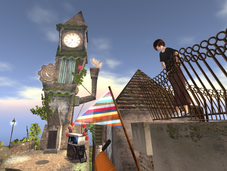
21st century learning has been a constant buzzword throughout the I DO Make a Difference modules. This is no coincidence, since it was the AASL who published Standards for the 21st-Century Learner (2007). One of the discussion questions asked for key words from the outline of Standards that stood out to us. This was my answer:
Reading is at the root of all learning, especially with the plethora of information available to us these days. Inquiry stands out; I'm seeing less curiosity towards learning in the students in my school, and I have to wonder why, especially since they have online access at school (which leads me then to think that we aren't letting them have access to it as much as we should!). If students lack curiosity and independent learning skills, then it is quite possible that as adults, they will not have the skills necessary to be fully engaged members of society, and will be easily misled and/or not live up to their full potential. I also like the idea that learning is social; if the learning environment promotes social learning, then it may be peer pressure that finally pushes apathetic students to become inquirers and learners themselves.
I have to admit that my view is skewed toward elementary level learning; hence, the focus on reading, which is essential for learning at any level. The challenge that we have as educators in today's world is to engage our students in such a way that they want to learn the necessary basic skills, even while we are competing against all the entertainment that is available to them outside the school walls. Such entertainment is often rapid-fire and spoon-fed, and so we are also challenged to teach students to think, go deeper, and value intrinsic rewards more than extrinsic gratification. It is a daunting task, and we must use technology and social learning to our advantage in reaching our students and preparing them to be active, knowledgeable, fully participating citizens. This goes against our educational history of desks-in-a-row, pencil-and-paper, individual merit systems; it's time to take the leap and make the changes, to help our students make full use of their thinking skills and creativity in the workforce and beyond.
Reading is at the root of all learning, especially with the plethora of information available to us these days. Inquiry stands out; I'm seeing less curiosity towards learning in the students in my school, and I have to wonder why, especially since they have online access at school (which leads me then to think that we aren't letting them have access to it as much as we should!). If students lack curiosity and independent learning skills, then it is quite possible that as adults, they will not have the skills necessary to be fully engaged members of society, and will be easily misled and/or not live up to their full potential. I also like the idea that learning is social; if the learning environment promotes social learning, then it may be peer pressure that finally pushes apathetic students to become inquirers and learners themselves.
I have to admit that my view is skewed toward elementary level learning; hence, the focus on reading, which is essential for learning at any level. The challenge that we have as educators in today's world is to engage our students in such a way that they want to learn the necessary basic skills, even while we are competing against all the entertainment that is available to them outside the school walls. Such entertainment is often rapid-fire and spoon-fed, and so we are also challenged to teach students to think, go deeper, and value intrinsic rewards more than extrinsic gratification. It is a daunting task, and we must use technology and social learning to our advantage in reaching our students and preparing them to be active, knowledgeable, fully participating citizens. This goes against our educational history of desks-in-a-row, pencil-and-paper, individual merit systems; it's time to take the leap and make the changes, to help our students make full use of their thinking skills and creativity in the workforce and beyond.

 RSS Feed
RSS Feed